

Discover more from Dani | Writes
“What’s in a name? That which we call a rose by any other name would smell as sweet”.
So pondered Shakespeare’s (somewhat overly dramatic) lovelorn teenage protagonist, Juliet, as she lamented how Romeo’s surname was at once entirely irrelevant to her passion for him and yet, utterly profound in keeping the two of them from their happily ever after.
What is in name?
That is a question I found myself asking as I dialogued with Aimee Byrd about what is (and is not) complementarianism over the last week.
Let me give you a brief rundown of how it all unfolded.
It started off when Aimee tweeted a link to a blog post she had written (are they still called blogs? Are we allowed to still use that word? Am I showing my age and digital illiteracy? Oh wait. Aimee also calls it a blog post. Phew. I’m in good company then!) called ‘Why Complementarians Can’t Listen’.
Here’s an excerpt from that blog post (piece, essay, whatever we’re meant to be calling it these days):
Complementarians don’t even listen to women, much less seek them for any positions of leadership. It is basic misogyny. Rot. Male superiority. […] Complementarians just can’t listen. It’s taken me many years and a lot of personal cost to accept this. They can’t. Because they foreground the (white) male voice. This is their posture.
Upon reading this, I retweeted Aimee’s original tweet with a little plea from me:
Not long afterwards, Aimee tweeted the following:
Following that, Aimee and I tried to have some extended discussion. I say “tried” because that task is nigh impossible on Twitter with its various sub-sub-sub threads and it’s character limits. For the record, “complementarianism” has 18 characters.
Now, I’m not going to go into the details of that full discussion. (Feel free to do the deep dive yourself if you so desire - just click here or on the image above). Instead, in this little mini-series of posts, I want to focus on just one particular aspect of it.
What (or Who) is NOT in a Name?
My objection to Aimee’s blog post had been her sweeping caricature about “complementarians” as a whole—namely that they are all misogynists who simply ‘can’t listen […] Because they foreground the (white) male voice’.
Each time Aimee, or Kristin Kobes Du Mez, or Beth Allison Barr, or other Christian critics of complementarianism tweet some grand sweeping statement about how all complementarians are rotten to the core (because complementarianism itself is rotten to the core), I—a female theologian, scholar, ordained Anglican deacon and pastoral leader who is also complementarian by conviction—am left with little option other than to conclude that they each perceive me, and encourage others to perceive me as being:
Utterly and completely invisible
An ignorant victim of Stockholm Syndrome (something an egalitarian man has publicly called me the past)
An active perpetrator of out-and-out misogyny
All of the above
But here’s the thing:
I’m not actually invisible. I’ve got a (loud) voice. I make a (significant) contribution. I (really) do exist. And people around me know it.
I’m not ignorant or stupid. I’m a woman with (at least some) intelligence who has been taught to think (carefully) for herself.
I am not a misogynist. Period.
And I’m not alone. There are a lot of us visible, intelligent, non-misogynist complementarian women out there.
On the multiple occasions I’ve interacted directly (or as directly as you can on Twitter) with each of the scholars mentioned above, I’ve asked them—in fact I’ve pleaded with them—to see that there is a wider context of complementarianism out there than just the form or expression or style of it which they consistently present and persistently (and often, quite rightly) critique. That the world is bigger than just the one they see or are familiar with.
But each and every time it is to no avail. It’s like we hit a brick wall and the discussion can go no further. There just seems to be no ability? willingness? both? to recognise that there might be some complementarians who do try to listen to women. Some complementarians who are committed to empowering women for forms of pastoral and theological leadership. Some complementarians who aren’t misogynists, but actually love and care deeply for women and who want to hear their voices.
In my recent interaction with Aimee, it became very apparent to me (and likely everyone else watching on with popcorn in hand) why I keep hitting that brick wall.
When I say “complementarian” I am specifically referring to it as a movement that started about 30 years ago, the teachings in its founding book (Recovering BIblical Manhood and Womanhood) and Danvers Statement.
You see… contemporary Christian critics of complementarianism don’t seem interested in asking “What’s in a name?”. Because they’ve already decided what is in it. And let me tell you, it ain’t me or women like me.
It doesn’t matter how many times I might call myself a complementarian. It doesn’t matter how many times I insist that I hold to independently and intelligently considered complementarian theological convictions. It doesn’t matter how many times I explain that my particular denominational context is heavily complementarian in its theology and practice.
None of that matters, because it seems that the term has already been defined in a way that excludes me from actually being able to call myself complementarian. Case in point 👇
In other words there is a fifth option in the multiple choice options. I am either:
Utterly and completely invisible
An ignorant victim of Stockholm Syndrome (something an egalitarian man has publicly called me the past)
An active perpetrator of out-and-out misogyny
All of the above
Not actually complementarian.
Well actually, I am. I am complementarian.
I have every right to call myself (and other women and men like me) by that name. Why?
Well, you’ll need to read the next post in this mini-series to find out the answer to that!






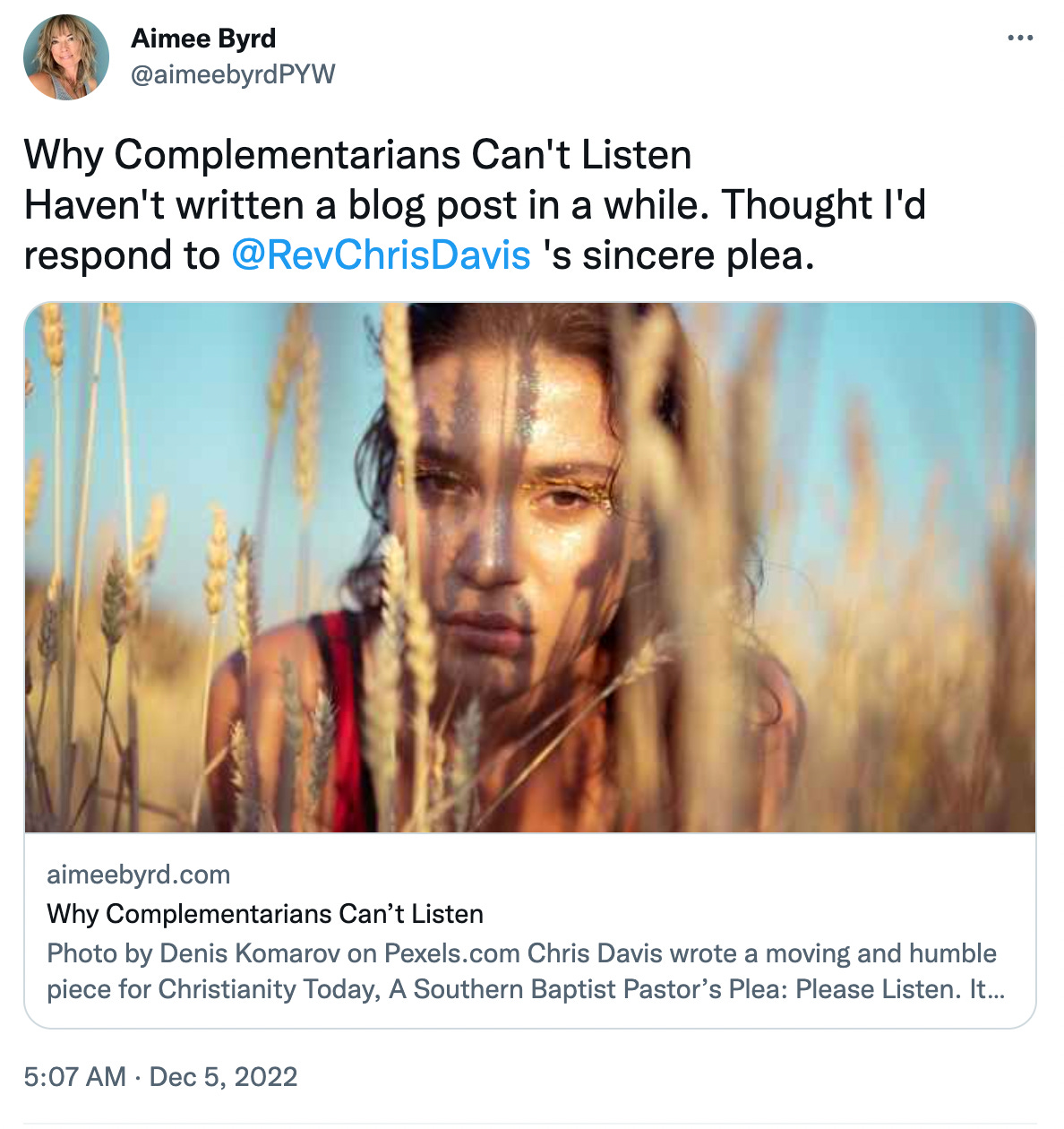
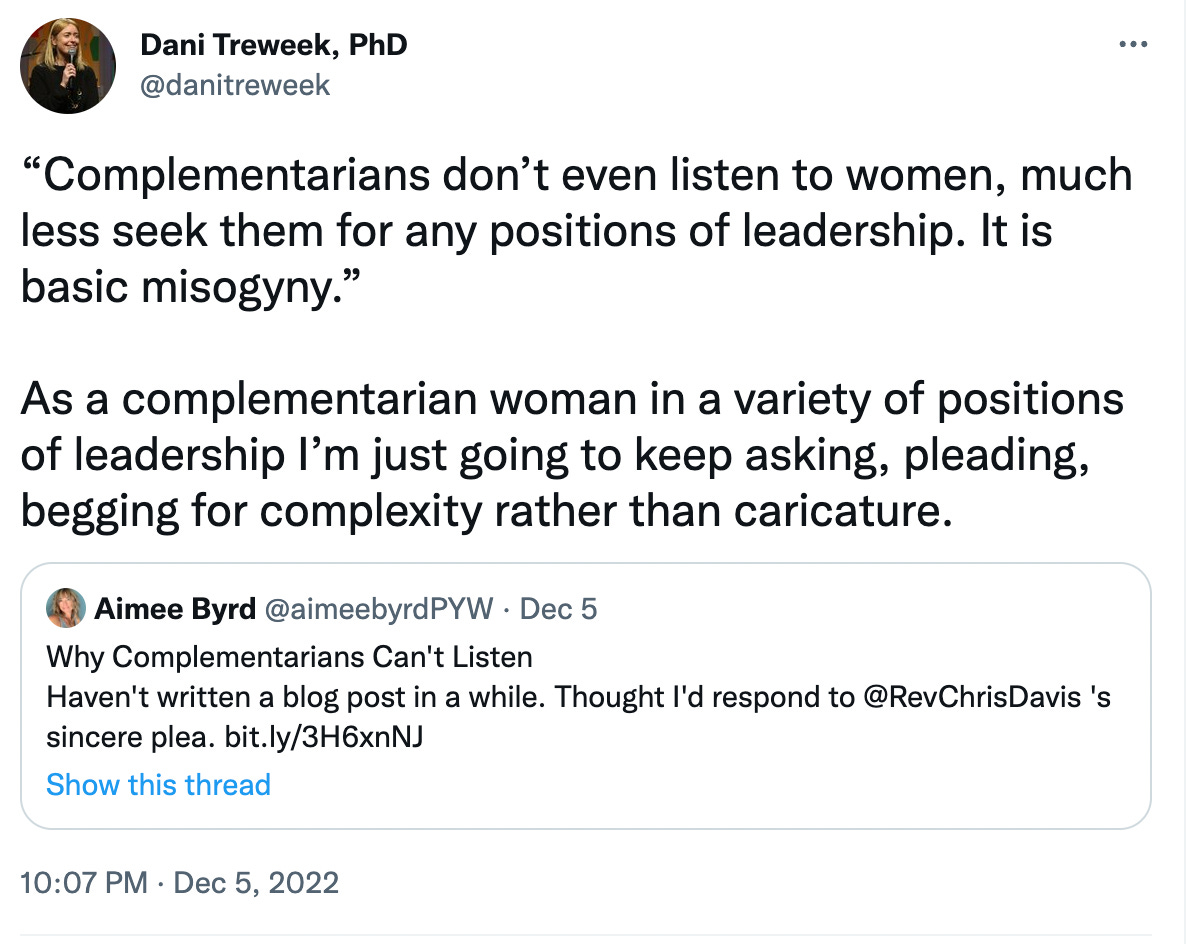
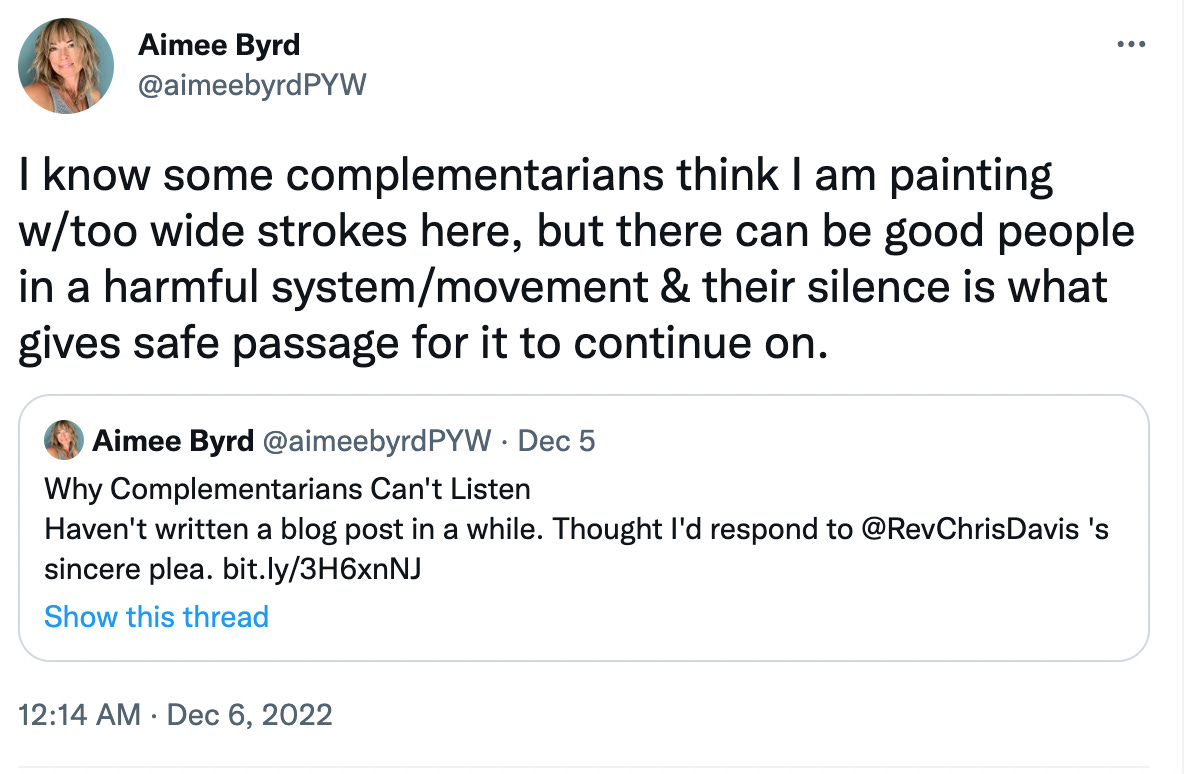
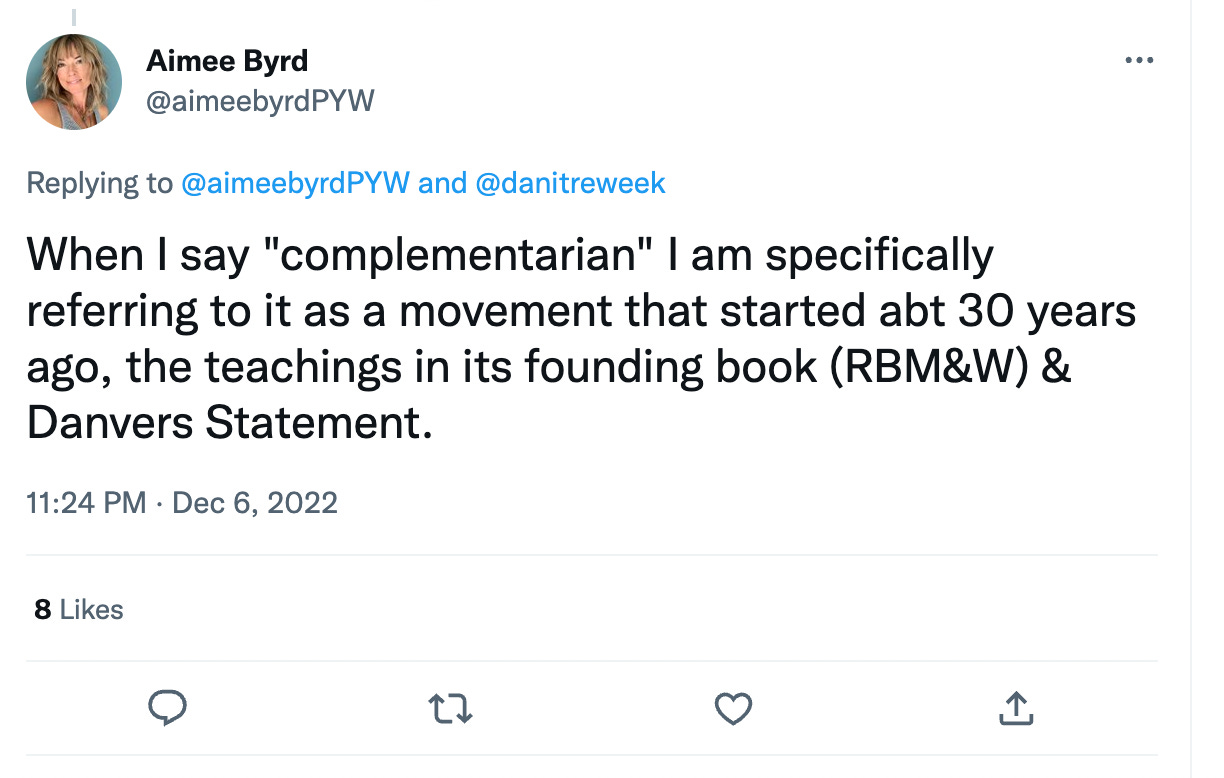
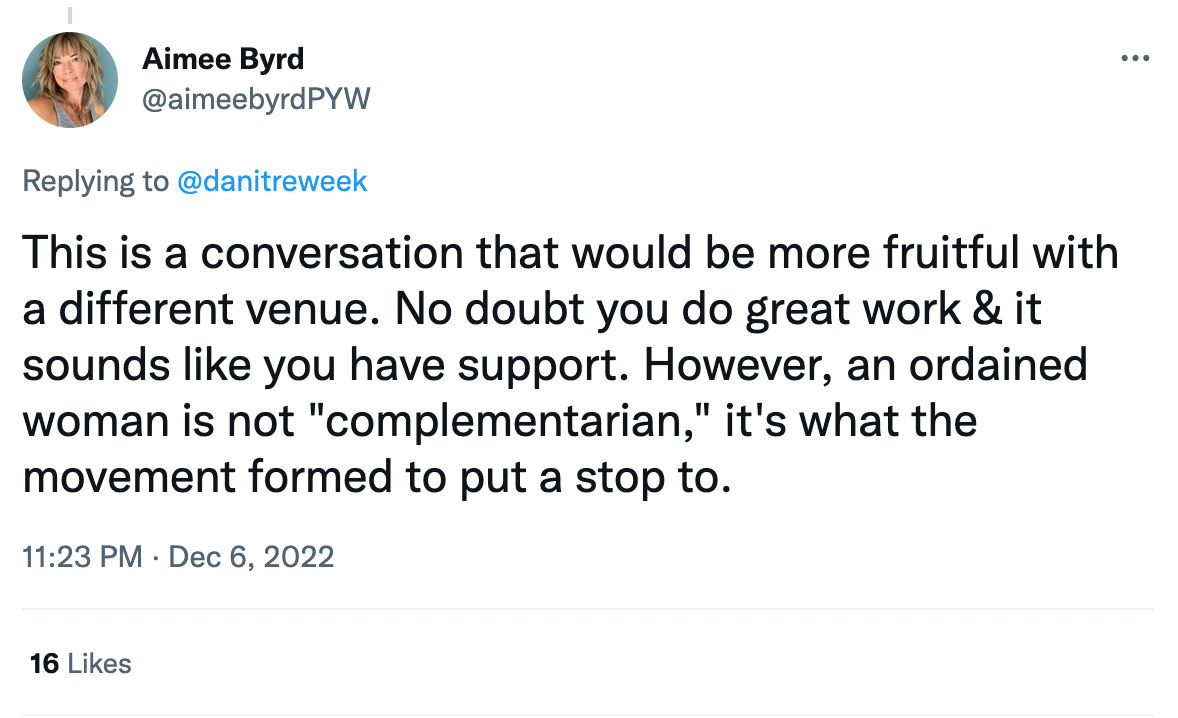
I notice that you also write on singleness. How can you be egalitarian if your not in that role yourself?
I see you as a hopeful complementarian. And we need more of that hope. If complementarianism lived up to its highest ideals, it would represent the best option. Unfortunately, the current state of Protestant clergy and luminaries is such that rock stars - even minor ones- are rewarded with power, influence, and wealth that would be unthinkable to a 1st Century Believer. Some number of clergy and luminaries have used that power, influence, and wealth to shield themselves from genuine accountability and meaningful consequences for sins, indiscretions, and abuse. Women in the pews and seats of churches need to ask themselves how much power and influence do they have when it comes to the official business of the church? I dare say most will answer "none". That power is vested in a small circle with a closed-loop feedback system immune to input from outsiders. However, all is not lost. As long as voices like yours can be heard, there's a chance more people will push their leaders to live up to the ideals of complementarianism and not slide down the path of egalitarianism.